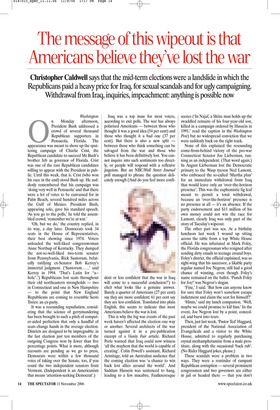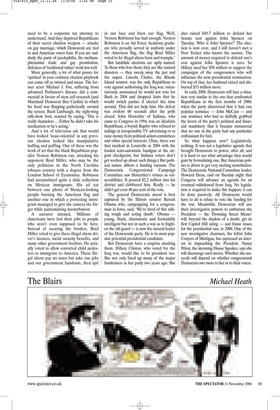The message of this wipeout is that Americans believe they’ve lost the war
Christopher Caldwell says that the mid-term elections were a landslide in which the Republicans paid a heavy price for Iraq, for sexual scandals and for ugly campaigning. Withdrawal from Iraq, inquiries, impeachment: anything is possible now
Washington
On Monday afternoon, President Bush addressed a crowd of several thousand Republican supporters in Pensacola, Florida. The appearance was meant to shore up the sputtering campaign of Charlie Crist, the Republican candidate to succeed Mr Bush’s brother Jeb as governor of Florida. Crist was one of the rare Republican candidates willing to appear with the President in public. Until this week, that is. Crist (who won his race in the end) stood Bush up. He suddenly remembered that his campaign was ‘doing very well in Pensacola’ and that there were a lot of votes to be canvassed for in Palm Beach, several hundred miles across the Gulf of Mexico. President Bush, appearing solo, gave his standard speech. ‘As you go to the polls,’ he told the assembled crowd, ‘remember we’re at war.’ ‘Oh, but we do,’ the country replied, in its way, a day later. Democrats took 34 seats in the House of Representatives, their best showing since 1974. Voters unloaded the well-liked congresswoman Anne Northup of Kentucky. They dumped the not-so-well-liked two-term senator from Pennsylvania, Rick Santorum, belatedly ratifying ex-Senator Bob Kerrey’s immortal judgment. (‘Santorum... ,’ said Kerrey in 1994. ‘That’s Latin for “a-hole”.’) Republicans lost seats throughout their old northeastern strongholds — two in Connecticut and one in New Hampshire — to the point that New England Republicans are coming to resemble Scots Tories: an ex-party.
It was a resounding repudiation, considering that the science of gerrymandering has been brought to such a pitch of computer-aided perfection that only a handful of seats change hands in the average election. Districts are designed to be impregnable: in the last election just ten members of the outgoing Congress won by fewer than five percentage points. What is more, although recounts are pending as we go to press, Democrats were within a few thousand votes of taking over the Senate, too, if you count the two independent senators from Vermont. (Independent is an Americanism that means ‘attention-seeking Democrat’.) Iraq was a top issue for most voters, according to exit polls. The war has always polarised Americans — between those who thought it was a good idea (54 per cent) and those who thought it a bad one (37 per cent). But there is also a new split between those who think something can be salvaged from the war and those who believe it has been definitively lost. You cannot inquire into such sentiments too directly, or people will respond with a reflexive jingoism. But an NBC/Wall Street Journal poll managed to phrase the question delicately enough (‘And do you feel more confi dent or less confident that the war in Iraq will come to a successful conclusion?’) to elicit what looks like a genuine answer. Barely a quarter of Americans (27 per cent) say they are more confident; 61 per cent say they are less confident. Translated into plain English, this seems to indicate that most Americans believe the war is lost.
This is why the big war events of the past week haven’t affected the election one way or another. Several architects of the war turned against it in a pre-publication excerpt of a Vanity Fair article. Richard Perle warned that Iraq could now witness ‘all the mayhem that the world is capable of creating’. Colin Powell’s assistant, Richard Armitage, told an Australian audience that the coming election was ‘a chance to win back lost allies around the world’. And Saddam Hussein was sentenced to hang, leading to a few macabre, Faulkneresque scenes (‘In Najaf, a Shiite man holds up the swaddled remains of his four-year-old son, killed in a campaign ordered by Hussein in 1991,’ read the caption in the Washington Post) but no widespread conviction that we were suddenly back on the right track.
None of this explained the resounding come-from-behind victory of the pro-war Connecticut Senator Joe Lieberman, running as an independent. (That word again.) In August Lieberman lost the Democratic primary to the Wasp tycoon Ned Lamont, who embraced the so-called ‘Murtha plan’ for an immediate withdrawal from Iraq that would leave only an ‘over-the-horizon presence’. This was the euphemistic fig leaf meant to permit a total withdrawal, because an ‘over-the-horizon’ presence is no presence at all — it’s an absence. If the party endorsement and $11 million of his own money could not win the race for Lamont, clearly Iraq was only part of the story of Tuesday’s wipeout.
The other part was sex. At a birthday luncheon last week I wound up sitting across the table from a top White House official. He was infuriated at Mark Foley, the Florida congressman who resigned after sending dirty emails to teenage errand boys. Foley’s district, the official explained, was so right-wing that his successor, a likable party regular named Joe Negron, still had a good chance of winning, even though Foley’s name remained on the ballot. ‘Punch Foley for Joe!’ was Negron’s slogan.
‘Fine,’ I said. ‘But how can anyone know for sure that Foley won’t somehow escape indictment and claim the seat for himself?’ ‘Hmm,’ said my lunch companion. ‘Well, maybe we could promise to kill him.’ In the event, Joe Negron lost by a point, conceded, and burst into tears.
Then, just last week, ‘Pastor Ted’ Haggard, president of the National Association of Evangelicals and a visitor to the White House, admitted to regularly purchasing crystal methamphetamine from a male prostitute, along with the occasional ‘back rub’. (No Rider Haggard jokes, please.) These scandals were a problem in two ways. They were a reminder of rampant Republican corruption — several prominent congressmen and two governors are either in jail or headed there — that you don’t need to be a corporate tax attorney to understand. And they deprived Republicans of their secret election weapon — attacks on gay marriage, which Democrats are tied to and American voters hate. If you are suddenly the party of paedophilia, the methamphetamine trade and gay prostitution, defences of ‘traditional values’ work less well.
More generally, a lot of what passes for ‘spirited’ in your ordinary election playbook can come off as twisted and mean. The former actor Michael J. Fox, suffering from advanced Parkinson’s disease, did a commercial in favour of stem cell research (and Maryland Democrat Ben Cardin) in which his head was flopping pathetically around the screen. Rush Limbaugh, the right-wing talk-show host, reacted by saying, ‘This is really shameless ... Either he didn’t take his medication or he’s acting.’ And a lot of television ads that would have looked ‘issue-oriented’ in any previous election looked like manipulative huffing and puffing. One of these was the work of art that the black Republican populist Vernon Robinson ran, attacking his opponent Brad Miller, who may be the only politician in the North Carolina tobacco country with a degree from the London School of Economics. Robinson had accumulated quite a slide collection on Mexican immigrants. His ad cut between one photo of Mexican-looking people burning the American flag and another one in which a protesting immigrant managed to give the camera the finger while pantomiming masturbation.
A narrator intoned, ‘Millions of Americans have lost their jobs to people who aren’t even supposed to be here. Instead of securing the borders, Brad Miller voted to give these illegal aliens driver’s licences, social security benefits, and many other government freebies. He actually voted to allow convicted child molesters to immigrate to America. These illegal aliens pay no taxes but take our jobs and our government handouts, then spit in our face and burn our flag. Well, Vernon Robinson has had enough. Vernon Robinson is an Air Force Academy graduate who proudly served in uniform under the American flag, the flag Brad Miller voted to let illegal aliens burn and trample.’ But landslide elections are aptly named. To those who lose them, they are like natural disasters — they sweep away the just and the unjust. Lincoln Chafee, the Rhode Island senator, was the only Republican to vote against authorising the Iraq war, ostentatiously announced he would not vote for Bush in 2004 and dropped hints that he would switch parties if elected this time around. That did not help him. His defeat was evident 60 seconds after the polls closed. John Hostettler of Indiana, who came to Congress in 1994, was an idealistic Republican, a boyish Baptist who refused to indulge in irresponsible TV advertising or to raise money from political action committees and other special interests. (True, there was that incident in Louisville in 2004 with the loaded semi-automatic handgun at the airport checkpoint, but Indiana voters don’t get worked up about such things.) But political nature abhors a funding vacuum. The Democratic Congressional Campaign Committee saw Hostettler’s virtues as vulnerabilities. It poured $2.2 million into his district and clobbered him. Really — he didn’t get even 40 per cent of the vote.
The general Democratic mood is best captured by the Illinois senator Barack Obama who, campaigning for a congressman in Iowa, said, ‘We’re tired of this talking tough and acting dumb.’ Obama young, black, charismatic and formidably intelligent but not in such a way as to frighten the old guard — is now the natural leader of the Democratic party. He is its most popular potential presidential candidate.
But Democrats have a surprise awaiting them. Hillary Clinton, who voted for the Iraq war, would like to be president too. She not only lined up many of the major fundraisers in her party two years ago. She also raised $49.7 million to defend her Senate seat against John Spencer on Tuesday. Who is John Spencer? The election is now over, and I still haven’t met a New Yorker who knows the answer. The amount of money required to defend one’s seat against John Spencer is zero. So Hillary used her $50 million to support the campaigns of the congressmen who will influence the next presidential nomination. On top of that, her husband raised and disbursed $33 million more.
In early 2008, Democrats will face a situation very similar to the one that confronted Republicans in the first months of 2000, when the party discovered that it had one popular nominee — John McCain — and one nominee who had so skilfully grabbed the levers of the party’s political and financial machinery that it became immaterial that no one in the party had any particular enthusiasm for him.
So what happens now? Legislatively, nothing. It was not a legislative agenda that brought Democrats to power, after all, and it is hard to see what advantage they would gain by formulating one. But American politics is about to get very exciting nonetheless. The Democratic National Committee leader, Howard Dean, said on Tuesday night that Congress will advance an agenda for an eventual withdrawal from Iraq. No legislation is required to make this happen; it can be done passively. All Democrats would have to do is refuse to vote the funding for the war. Meanwhile Democrats will use their investigative powers to embarrass the President — the ‘Downing Street Memo’ will, beyond the shadow of a doubt, get its first Capitol Hill airing — and frame issues for the presidential race in 2008. One of the new investigative chairmen, the leftist John Conyers of Michigan, has expressed an interest in impeaching the President. Nancy Pelosi, the incoming House Speaker, says she will discourage such moves. Whether she succeeds will depend on whether congressional Democrats owe more to her or to their voters.



































































































 Previous page
Previous page